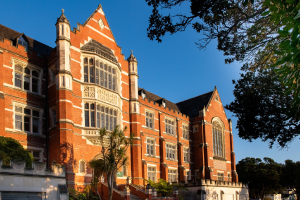Kelburn, Wellington 6012, New Zealand
Career Counselling

The Victoria University of Wellington is a leading academic and research institution located in the capital of New Zealand. With over 23,000 students enrolled at the university, including overseas candidates from 100+ countries, it is New Zealand’s highest ranked University by quality of high impact research.
Academic and research activities at the University are organised into nine Faculties (Education, Humanities and Social Sciences, Law, Graduate Research, Business and Government, Architecture and Design Innovation, Health, Engineering, and Science...
| Establishment year | 1897 |
| Total Students | 23,090 (2021, full time + part time) 18,242 (2021, equivalent full time students) |
| International Students | 1,311 (2021, equivalent full time students) |
| QS World University Rankings 2024 | 241 |
| Campus Size | N/A |
| Total Number of Campuses | 3 (with additional premises in Auckland) |
| University Website | https://www.wgtn.ac.nz/ |
| No. of Schools and Divisions | 9 Faculties |
| Nobel Prize Winner Alumni | 1 |
| No. of Education Programs | 132 (UG subjects), 133 (PG subjects) |
| Student to Faculty ratio | 15.9:1 |
The Victoria University of Wellington offers undergraduate and postgraduate courses through 9 Faculties, which are further subdivided into schools, institutes and centres.
Domestic undergraduate applicants have to satisfy University Entrance requirements (NCEA Level 3, or good academic performance in CIE, IBDP, or other NZ secondary examination), fulfil course-specific criteria, if any, and apply before the prescribed deadline.
International undergraduate applicants to the University must achieve a minimum level of academic performance in their school leaving examinations and must demonstrate their English proficiency. The exact criteria for each country that is represented in the current student body may be viewed on the relevant webpage. If a student does not meet the academic criteria, he / she can sign up for the Foundation Studies course, which is designed to bridge the gap needed so that the student can join an undergraduate programme. The English for Academic Purposes course at the University is 12 weeks long, and is designed to improve the level of a candidate’s English skills to a point where it does not hinder coursework at the UG level.
International postgraduate applicants can meet the academic requirements for admission if they have at least a B- (or equivalent) level of academic performance in their UG degree. Different degrees may require additional qualifications; the course page lists all requirements. The level of English proficiency needed (and the qualifying test certificates that are valid) is listed for each country on the University webpage. PG applicants who do not meet the requirements should contact the University and craft a path towards joining. The main criteria for domestic PG applicants are the average grades scored in their undergraduate degrees.
The online application, admission, and enrollment processes are similar for all applicants (UG, PG, domestic, and international) to the University.
Domestic undergraduate students pay the lowest tuition fees at Victoria University of Wellington: these are course-specific, and range from $6,006 per year (Humanities and Social Sciences) to $8,793 per year (Engineering).
International UG students pay tuition fees that are up to 400% higher than the corresponding fees for undergraduate domestic students. For example, the annual tuition fees for a course in the Faculty of Humanities and Social Sciences are $30,550 and $39,748 in the Faculty of Engineering.
Postgraduate domestic students’ tuition fees vary by course: from $8,352 per year (Humanities and Social Sciences) to $10,228 (Law).
Postgraduate international students have the highest tuition fees on average: from $33,409 (Humanities and Social Sciences) to $43,037 (Architecture).
All students must also pay the Student Services Levy ($500 per year on average) and the Student Assistance Levy ($28 per year on average), as additional costs that help fund education for fellow students who are experiencing financial hardship.
Over and above these, living costs (accommodation, food, personal spending, and travel) can be estimated using the University’s cost calculator online tool, and usually amount to approximately $15,000 - $20,000 per year.

Victoria University of Wellington has campuses in the city of Wellington and in Auckland. The main Kelburn campus is located close to the city centre of Wellington; it is the largest of the locations, and most first year courses happen there. The Pipitea campus is located in Wellington's Central Business District: it houses the School of Business and Government and the Faculty of Law. The Te Aro Campus is home to the Faculty of Architecture and Design Innovation, and consists of two buildings near the striking and interesting Cuba Street. A few courses are also offered at the University's premises in the Auckland Central Business District. The Miramar Creative Centre allows students to learn filmmaking and multimedia design.
The University operates two fitness studios at Kelburn and Pipitea. These have modern weight training facilities as well as the best cardio equipment. In addition, there are dedicated spaces for boxing, functional training, weightlifting, and a climbing wall. Group exercises classes include pilates, yoga, and zumba, so that every member of the Wellington community can enjoy the emotional wellbeing that comes with physical fitness.
The membership fees are an affordable $209 for students of the University for the full 12 month period, only 40% of the cost for a member of the general public. There is a small additional fee for group exercise classes.

Sports clubs are an integral part of life at the University. Four especially prominent clubs - netball, lacrosse, football, and cricket - welcome members of the public to sign up, and are large and inclusive. These are just a few of the 138 Student Clubs at the University, which include special interest groups focused on the arts, sports, faith, academia, regional cultures, and more!
The Wellington Careers and Employment section helps students with job and internship searches, and readiness for the ideal career. It provides online and offline career preparation tools, as well as opportunities for students to get their CVs checked in person. It also helps students schedule guidance sessions with career consultants. It sets up career expos and seminars to facilitate networking between employers and students. It supports recent graduates of the University as well; they can use the online job listing service, and attend most career fairs and seminars.
The University maintains a scholarships database for international and domestic students to search through all awards available. The most prestigious scholarship for international undergraduates is the Vice Chancellor's International Excellence Scholarship; awardees have their tuition fees during their first year of study reduced by $10,000. There are limited places, and awards are made on the basis of academic excellence. There is no separate procedure for applying to this scholarship; applications are automatically scrutinised to award it. The Tongarewa scholarship is similar: the amount can be either $5,000 or $10,000.
For postgraduate students, the Wellington Graduate Award is available to both domestic and international students; its value is $5,000, and this amount is paid towards tuition fees. Certain programmes (Master of Conservation Biology, International Trade, Marine Conservation) have automatic Master’s scholarships of $10,000 attached to them for all international students who qualify for admission. The prestigious Manaaki New Zealand Scholarships Programme offers the chance to study at the University through a fully funded opportunity - students from Commonwealth countries, and multiple eligible countries in Asia, Africa, and the Caribbean, can apply.
